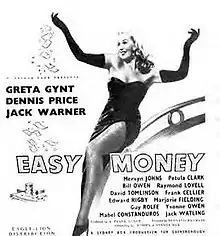Easy Money (1948 film)
Easy Money is a 1948 British satirical film about one of the most beloved traditions of the English, the football pools, is composed of four tales about the effect a major win has on four different groups in the post-war period. Written by Muriel and Sydney Box based on the play "Easy Money" written by Arnold Ridley and directed by Bernard Knowles, it was released by Gainsborough Pictures.
| Easy Money | |
|---|---|
 Original poster | |
| Directed by | Bernard Knowles |
| Produced by | A. Frank Bundy |
| Written by | Arnold Ridley (play) Muriel Box Sydney Box |
| Starring | Greta Gynt Dennis Price Jack Warner Petula Clark Mervyn Johns |
| Distributed by | Gainsborough Pictures |
Release date | 20 January 1948 |
| Country | United Kingdom |
| Language | English |
| Budget | £116,821[1][2] |
| Box office | £125,300 (by Dec 1949)[1] |
Plot
In the first story, a comedy, a content suburban family, headed by Jack Warner, is turned into an unhappy lot when they believe that they have the winning coupon in the football pools. But when it's discovered that the winning coupon apparently wasn't mailed by the younger daughter (Petula Clark), they regain their previously happy lives that had been made unhappy by plans they made regarding how to spend their winnings. Then, when it is discovered that the winning coupon was, in fact, mailed, they decide that they have learned their lesson and resolve not to let the money ruin their happiness.
The second is more tragic, with a mild-mannered clerk (Mervyn Johns) concerned about quitting his mundane job.
The third is a suspenseful crime caper involving a coupon checker (Dennis Price) and his nightclub singer girlfriend (Greta Gynt in a send-up of Rita Hayworth's Gilda) who devise a scheme to embezzle the winning pot.
The final episode, another comedy, concerns a dispirited bass player (Edward Rigby) who discovers he misses the orchestra he left.
Cast
- Greta Gynt as Pat Parsons
- Dennis Price as Joe Henty
- Jack Warner as Philip Stafford
- Mervyn Johns as Herbert Atkins
- Marjorie Fielding as Ruth Stafford
- Yvonne Owen as Carol Stafford
- Jack Watling as Dennis Stafford
- Petula Clark as Jackie Stafford
- Mabel Constanduros as Grandma Stafford
- David Tomlinson as Martin Latham
- Maurice Denham as Detective-Inspector Kirby
- Joan Young as Agnes Watkins
- Gordon McLeod as Cameron
- Grey Blake as Wilson
- Ernest Butcher as Clerk
- Bill Owen as Mr Lee
- Hugh Pryse as Martin
- Jack Raine as Managing Director
- Richard Molinas as Johnny
- Edward Rigby as Edward "Teddy" Ball
- Guy Rolfe as Archie
- Raymond Lovell as Mr Cyprus
- Frank Cellier as Director of Orchestra
Reception
Critics at the time noted the film was faintly reminiscent of the all-star 1932 Hollywood release If I Had a Million. It earned mixed reviews, but proved to be popular with audiences – still reeling from the effects of World War II – seeking lighthearted entertainment.
The film earned a profit of £2,200.[1]
References
- Andrew Spicer, Sydney Box Manchester Uni Press 2006 p 210
- Spicer, Andrew. "'The Apple of Mr. Rank's Mercatorial Eye': Managing Director of Gainsborough Pictures". Academia.edu.au. p. 106.
Gainsborough Melodrama, edited by Sue Aspinall and Robert Murphy, published by the British Film Institute, London, 1983
External links
- Easy Money at IMDb
- Easy Money at AllMovie